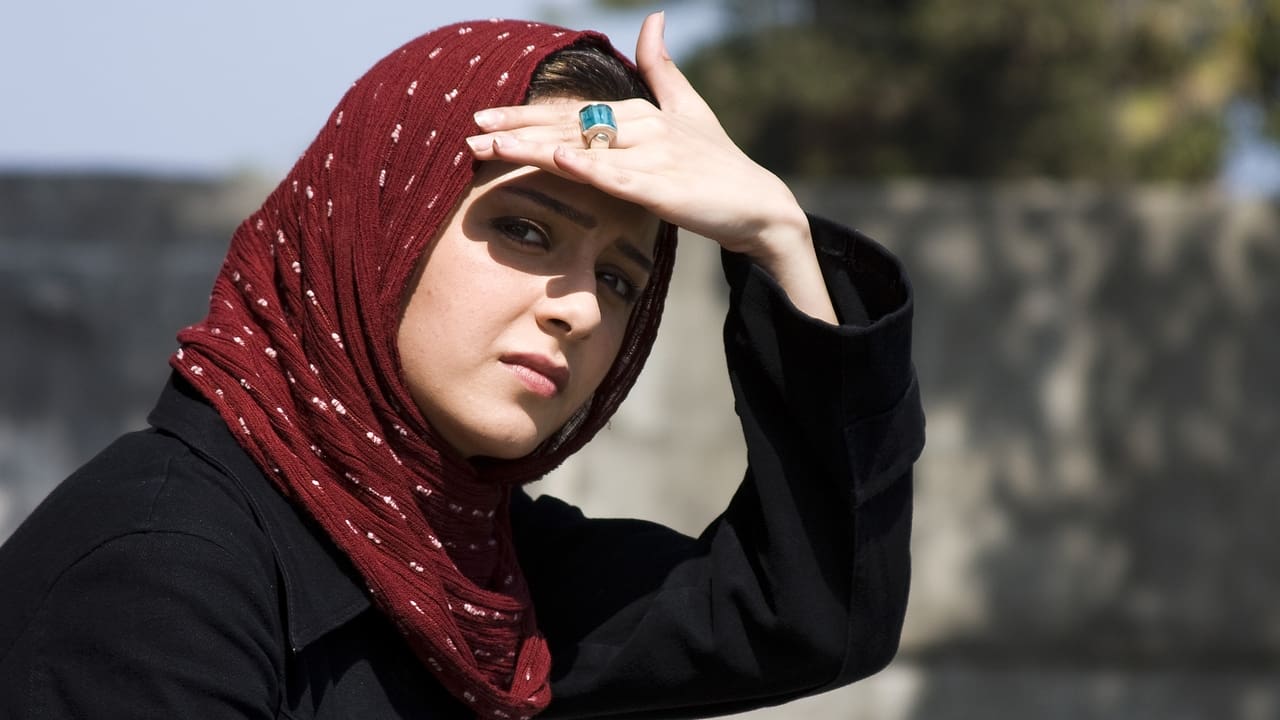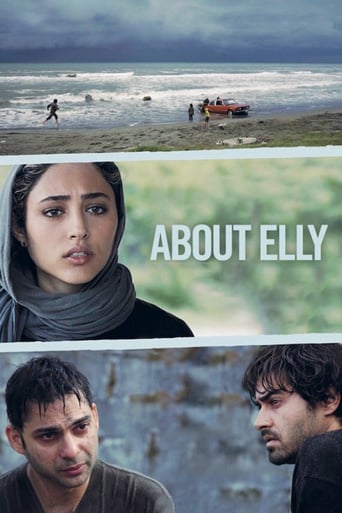MamaGravity
good back-story, and good acting
ClassyWas
Excellent, smart action film.
filippaberry84
I think this is a new genre that they're all sort of working their way through it and haven't got all the kinks worked out yet but it's a genre that works for me.
Philippa
All of these films share one commonality, that being a kind of emotional center that humanizes a cast of monsters.
borislav_dimitrov
I became a big fan of Mr Farhadi after I watched ''A Separation'' by coincidence on the TV. Then I watched ''The Salesman'', ''The Past'' and ''Beautiful City''. All of them are wonderful movies but this one, ''About Elly'', is probably the most distant from the universal/ global dimensions and messages of Farhadi's movies. I am very curious and interested in the Iranian/ Persian culture and customs and have started to collect information about them, even plan to start to study Farsi and/ or one day to visit Iran. Nevertheless, the story in ''About Elly'' remains for me a bit unrealistic/ non-authentic as Elly is only engaged and having a fiancee for 2 years, so, it might not be extremely difficult for a woman like her to refuse a marriage and to annul the engagement. Even though with some negative consequences for her but bearing in mind that engagement is only a promise for a marriage but still not the marriage itself. And if a marriage is not happening 2 years after the engagement, then it might be admissible simply to go off the engagement.The big goof in this otherwise very strong and emotional movie is what would have happened, if Elly and Ahmad had matched and decided to go together in the usual way? Elly would have to announce the end of the engagement and to accept a new one or directly to marry Ahmad. The power of the promise in the engagement is widely known and applied in Europe at least up to the end of the WWII but it had never been equal to the union of the marriage and, although rarely, could have been annulled in an easier way than a marriage.Therefore, Elly's situation in the story of the movie seems a bit non-authentic and probably not quite understandable for people outside of or unfamiliar to the Iranian culture, which makes the movie weighting less than the other Farhadi's movies.I presume the authors of the movie wanted to raise again the issue of the social situation of women in Iran and their right of independence and free choice of a partner. Probably this is a reason to present Elly's story in this way. However,if Elly had just ''escaped'' from her fiancee with Ahmad, it would have been a worse and less acceptable decision than simply annulling the engagement with an open and honest announcement. I can appreciate the call for more freedom and social rights to women in general and in Iran, but this might not be linked to ''copying'' the ''bad'' from the ''western model'' - dishonesty and attempt for or a true cheating. Interpreting the movie in a broader way, probably this behaviour somehow justified the tragic end of Elly in the story. Faithful to his style, Farhadi leaves the final of the movie a bit open - what will happen with Sepideh - the friend who had invited Elly in the trip and who had lied to her husband and the others about the story; also - who will inform Elly's family about her death - her fiancee or the others, probably the fiancee will prefer to have Elly dishonored (in a response to her betrayal from his point of view and according to the customs in the country)?The fact that this is 58th review of this movie here and the overall rating is above 8 out 10 shows that it makes us think and feel and definitely it is a movie worth a watching.Great anticipation for the new movie of Mr Farhadi - ''Everybody Knows'', just to be released in a few days...
rdoyle29
A group of friends go to the shore for a long weekend. One of them brings her friend Elly with the intention of introducing her to their divorced friend. About halfway through the weekend, she disappears. There's reason to believe that she may have left without telling anyone, but there's also reason to believe that she may have drowned. As the remaining folks look for her, and further consequences of her disappearance are revealed, cracks in the relationships are revealed and deepen. As with "A Separation", Farhadi takes a genre procedural plot and turns it into a drama about the morality and consequences of our decisions.
sharky_55
Is the space in About Elly about merely a class divide, or does it also concern sociopolitical difference? Certainly Asghar Farhadi's representations will challenge what little and genuine coverage of the middle east we have in the west. He assigns the three middle-class families on vacation atypical cultural markers which aim to familiarise: their rambunctious hollering and yelling from their cars in a tunnel, the sporting of sunglasses on foreheads, the way they dance and play pranks with a bathroom door missing its lock. Although the women still wear their headdresses, these moments seek to de-mystify and wave away the inbuilt modesty of Iran that we may be more accustomed to. The boy overseeing the villa observes them with a strange curiosity as if he was mesmerised at the apparent freedoms they are afforded (and willingly flaunt). They joke about how wives have surpassed their 'masters' - western domestic scenes will find the same humour in the imagery of a ball and chain. But later Amir might as well wield the whip and tassel himself as the arguments turn physical. It seems that their modern guise may be little more than a slip-on. The openness and immodesty of these introductions may lure an viewer into a false sense of security, believing the characters and setting to have freed themselves from the implicit cultural codes of propriety and honour that still rule modern day Iran. A closer glance reveals lies that are offered easily because of certain situations, and how little white ones enlarge and begin to swallow them. We see how Elly conceals the purpose of her trip to her mother, and how this later takes on a more deceitful tone. Sepideh likewise partakes in this practice, using it as a tool to barter for their accommodation, but the lie reveals other lies that may have already become truth in her mind. Is the partnership that she has set up already becoming a betrothal in her eyes? Is it merely a matter of time between the young teacher and the handsome divorcée? What Farhadi does is merge these questions of class and culture into a typical mystery, and expose how little we know and understand these characters beyond their surface. Slowly, the dialogue and interactions unveil the more conservative mindsets that rear their head when push comes to shove. Ideals of womanhood and femininity are warped and bargained; they tease each other about their domestic duties and place, and make reference to the virtues of the fairer sex ("A woman must come", "Better if a woman calls"). See how Elly shrinks to what she believes must be her default state in the household, shunted into corners, into backseats, offering to clean, not quite comfortable with the ease of her companions (especially the female ones, as they later interrogate what seems like an offhand comment). In one moment they are playfully rubbing Arash's head for his contribution in charades, the next propping him up like a toy and probing him for answers (and when that does not reveal more, mistreatment comes into play). Jafarian visualises the sudden disconnect through his blocking, where the group, once bunched together on the couch, and able to face each other in circles, are now separate individuals, leaning against walls, wandering away off the path, storming in and out of rooms to conduct their own conversations and investigations. His greatest achievement is the follow shot that captures Elly's last living moments on screen; the camera tracks her as she flies the kite, never allowing her to leave the confines of the frame, and holding and holding until her peals of laughter become uncertainty. The shakiness of the camera and the cuts becomes more and more erratic, and Jafarian merges form and content into a visualisation of Elly's shocking realisation that a kite, however freely and gracefully it rides the winds, is still tethered to its holder via string. Farhadi is known mostly for his Oscar winning A Separation, one of the great films of the 21st century that pondered struggles of religion, class and gender within the context of personal predicament. One of its greatest strengths was its utter refusal to create bias and take sides - we are able to survey the events from the perspective of all its participants, and understand even the actions that we most ardently disagree with. Some of the figures in About Elly are harder to empathise with. We are not quite sure, for example, exactly the type of monster that her fiancé may or may not be, and how this factored into her choice. The film has been compared widely to L'Avventura, and in forming these comparisons I have come to see that the best films about the mystery of a disappearance forgo the cold logic and process of a thriller and instead survey the effects on those surrounding the event. Antonioni's modernist masterpiece began with the same premise, but descended into a harsh exposure of the shallow excess and emptiness of its characters' existences. Spoorloos, or The Vanishing, another foreign film in the same vein, reveals its murderer and motive early on, but is more interested in investigating the evils and pitfalls of curiosity and guilt over time. Similarly, About Elly is not wholly concerned with solving the mystery, but instead focuses on how its characters partake in lies and deceit, and how this unearths older, buried issues they have tried so desperately to discard.
The_late_Buddy_Ryan
"Elly" seems like a rough sketch for "A Separation" (2011), one of the best films of this century IMHO. In both cases, Farhadi's focused on social lies and deceptions and the ways they come back to bite us—as well as on the contrasts and contradictions between the lives and aspirations of contemporary Iranians and the restrictive social norms of Islam—but "Elly"'s not as tightly plotted or as involving. In many ways it's like typical film-festival fare from a non-Western country—it's a little hard to keep track of the characters at first, and it's not always clear why they're behaving the way they do… The setup's intriguing: old college friends from Tehran—three married couples and their kids and a recent divorcé—and a slightly mysterious plus one, Elly, share a clapped-out weekend cottage on the Caspian Sea. At first everyone's acting goofy, singing and busting little Zorbalike dance moves. Then something happens—two things really—and everything changes. The sky darkens, the sea gets rough, and husbands and wives are (almost literally in one case) at each other's throats. Suddenly these 21st-century sophisticates are chattering about evil portents and lost honor and fear of shaming; several layers of deception have to be unwrapped before the film's ambiguous ending. Expert cast (including the husband from "A Separation" and Nefertari from "Exodus: Gods and Kings"!); the performances seem a little over the top at times, but that may just be a cultural thing; great cinematography. Certainly worth watching, prob'ly more so if you've already seen "A Separation."

